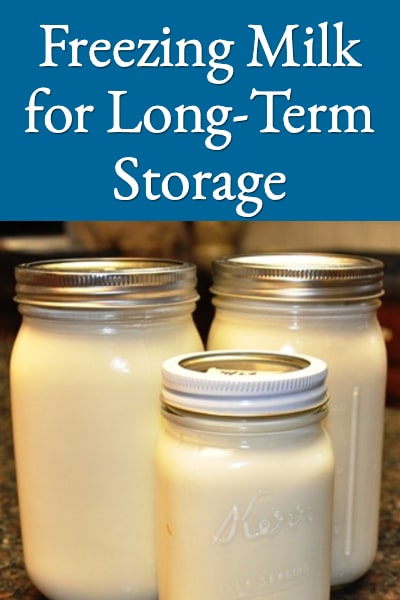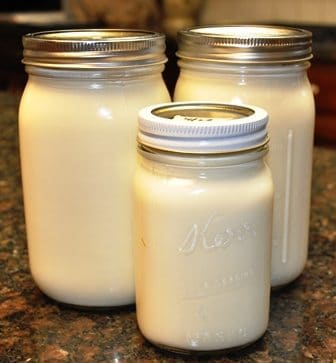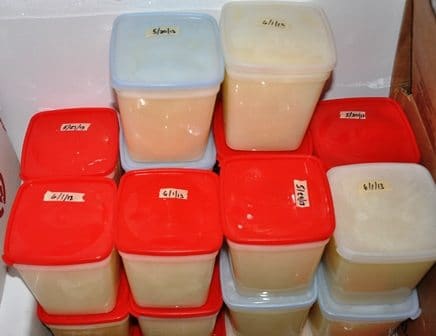
One of the great things about having Nigerian Dwarf goats (see 5 Reasons You Should Choose Nigerian Dwarf Goats For Milk for more) is the wonderful tasting milk they produce. And one of the advantages of the breed is that they can be bred year-round (unlike standard breeds) so that kidding can be staggered to keep the milk supply constant.
However, it’s more convenient for us to have them all kid in spring, and that means that there’s no fresh milk for at least two months just before kidding. Actually, I hate milking the goats in cold weather anyway, so it’s more like four months without fresh milk (December – March) for us.
So, we freeze excess milk as the year goes along, and drink it all winter after the does are dried off. We found that the milk maintains its’ excellent flavor after thawing, although it does have a tendency to separate a bit. To combat any separation, we simply mix it in the blender a minute or two after thawing and prior to storing it in the refrigerator.

Fresh Milk Stored In Mason Jars Prior To Freezing
It’s not a good idea to mix Nigerian milk too long though, one morning we mixed a little too long and had whipped cream for cereal rather than milk (still very good!).
What Milk Should You Freeze for Long Term Storage?
Any milk can be frozen for long-term storage – it doesn’t have to be goat milk and it doesn’t need to be fresh from the animal like ours – that just happens to be what we have. If the grocery store is running a great deal on milk and that’s where you normally get yours, then stock up and freeze some to save money. You can use goat or cow, pasteurized or unpasteurized, fat-free, low-fat, or whole milk.
How Soon Should You Freeze the Milk?
When freezing milk for long-term storage, it’s best to freeze it as soon as possible after milking and cooling, or after bringing it home from the store. This ensures the best flavor and longest shelf life after thawing. If you wait until it’s close to going bad before freezing, then the shelf life after thawing will be very short. The fresher the milk is when you freeze it, the higher quality it will be after thawing.
Should You Freeze It Warm or Cold?

Fresh Milk Stored In Plastic Freezer Containers – Stacked In The Freezer
If freezing farm-fresh milk you should start with milk that’s already been cooled quickly to refrigerator temperature. Starting with warm milk may result in a cooling rate that’s too slow for the best quality milk and may also greatly increase separation. So, cool the milk as rapidly as possible before freezing.
What Container Size Should Be Used for Freezing Milk?
We found that it’s better to freeze milk in smaller containers, they freeze faster which helps maintain milk quality, and they also thaw faster in the refrigerator. We’ve used both quart glass canning jars and rectangular plastic freezer containers and found both work well. Just remember to leave enough headspace in the container to allow for expansion (milk expands approximately 10% on freezing) or you may end up with broken containers if using glass.
What Container Type Should Be Used for Freezing Milk?
I’ve heard of using Ziploc bags for freezing milk, but we’ve never tried it. The plastic freezer containers seem the most convenient for us – they stack well, are easy to clean in the dishwasher, and prevent odors (here are the freezer cartons we use: One Quart Plastic Freezer Cartons). Milk will readily absorb odors, so it’s best to use as airtight a container as possible. Glass canning jars are more airtight, but are not as convenient or cost-efficient of a choice for us. Plastic milk jugs are another possibility but we’ve avoided using them as they are difficult to get really clean and are not airtight.
I don’t know why we never considered freezing milk before getting Nigerian Dwarf goats, not only is it a good way to store excess milk but it’s also a good way to take advantage of sales at the store. Anyway, we’re now happily freezing milk as we go, knowing that we’ll have great tasting milk for the winter months after the girls stop producing.
Ryan says
I’m bookmarking and will be tweeting this to my followers! Terrific blog and brilliant content
Jo says
I freeze dry my fresh goat milk and vacuum seal in plastic bags. The taste has been as good as fresh. I put it in a blender and add about a cup of hot water and blend then I pour it into a quart jar and finish filling with cold water.
Lesa says
Hi Jo, Sounds like a great method! Seems like storage would be a lot more efficient than freezing. What do you use to freeze dry the milk?
Ross says
If you can find ETFE, FEP, or PFA bottles they are an absolute great product for storing and freezing milk. The rest here is probably more information that you want but might interest some, so here it is. These bottles are made of a material which has many other advantages besides freezing and storing milk. They are used in the pharma world to store and transport drug substances and intermediates, so these are very clean, PFA, ETFE, and FEP are made of FDA approved resins. The PFA and ETFE bottles are especially suitable for critical applications and processes, in which valuable drug substances and final products are being filled and afterwards frozen by using liquid nitrogen. Due to their enormous temperature resistance of up to -200 °C to +50 °C, these bottles can be frozen without any problems. The bottles have outstanding leachable and extractable values and are nearly unbreakable due to their robust design. There is a downside, they are very expensive, however containers can be found if you are on the lookout for them.
Lesa says
Hi Ross,
Thanks for the info on these containers, I need to check them out!
Shannon Jurdzy says
How long can you freeze milk
Lesa says
Hi Shannon, most places seem to recommend from 2 – 6 months; however, we start freezing excess milk around May and then begin using it when we quit milking (usually in December). So, some of the milk we use if frozen for about a year before we use it, and it still seems to taste great to us.
Kansas Allen says
I own a dairy cow and have tried a couple of ways to freeze milk. The ziplocs were great for stacking, but leaked when defrosting and were difficult to deal with when the milk separated. I tried glass jars and no matter how much headspace I did a lot of the jars broke! I now use new plastic quart containers and love them! I take one out and in about 48 hours use my hand blender to mix. The kids gobble up the milk like it was fresh, and my only regret this year was not freezing enough, we’ve had to buy storebought and my cow won’t calve for another month. I’d like to know where you bought your containers? Mine were bought off Amazon and the import and border fees were horrible.
Lesa says
Hi Kansas, well it looks like the 1 quart ones on Amazon are about $6.00 for 3, but I don’t have import and border fees. The other place I have found them locally are the ACE hardware store – I think for about the same price. The other thing you might think about is going to a restaurant supply store and getting the round quart containers like they put soup in from a Chinese takeout. You can usually get them in larger quantities for much more reasonable prices. The ones that look like this: http://www.amazon.com/Reditainer-Extreme-Containers-32-Ounce-24-Pack/dp/B00N2TADOY/ref=pd_sim_79_4?ie=UTF8&dpID=31dgFCYbD7L&dpSrc=sims&preST=_AC_UL160_SR120%2C160_&refRID=1R0VY2C8TAYNFQ5ZAM49
Jamie Schultz, Ohio says
I freeze our goat milk and have had the separation occur. My experience has been small waxy chunks, and if strained, you would never know. I have used glass quart jars and they do not stack well or position well in the freezer. I did can some milk last year but haven’t tasted it yet. Just seems weird I guess. I always avoid plastic but last year I broke down and bought Rubbermaid quart liquid holders and froze it. Taste is fine, but I am concerned about the chemicals that leach into food, wondered your thoughts.
Helen says
Hi Jill
I too have Nigerian dwarf goats and freeze their milk . I use gallon size zip lock freezer bags and lay them flat in the freezer to freeze. They are easy to store because they are thin and flat once frozen. I can stack them on top of each other or stand them up, however they fit best in the freezer space. I also write the date on the bags and the volume.
The only small problem I have is the bags leak when I defrost them so they need to be in some kind of container or standing in a bowl to catch all the drips.
Laura says
Yeah we’ve been buying enough raw milk for a month and freezing in pint jars, just take one out every day and it’s thawed out by the next morning. Tastes really good.
Diane Sanders says
Love the article, and very timely! Thanks so much!!
Grandma Len says
I buy fresh, raw milk from a local dairy about every 3 weeks. There are only 2 of us (older folks) so we don’t drink or use a lot of milk but when we do we want fresh, raw. So as soon as I get my gallon home, I freeze most of it in wide-mouth quart jars, leaving space at the top, And when we need more, I thaw it out for a few hours on the counter (still has ice in it) and then put it in the fridge for use in about 12 hours. So far, we have not noticed any loss of flavor. Maybe it’s because we use in up in a few weeks and I do freeze in glass because I’ve quit using non-glass containers
Lesa says
Hi Grandma Len, I think that’s so smart, buying fresh raw milk and freezing it. I don’t know why we never considered it until we had the dairy goats. And, the glass jars are probably the best choice – they’re the most airtight and won’t transmit flavors, odors, or unwanted chemicals.